Betaglukan a infekce
Beta glukan je u infekcí studován velmi dlouho, prakticky od samého začátku. Proto nepřekvapí, že účinnost beta glukanu byla opakovaně prokázána na mnoha experimentálních modelech, a to jak bakteriálních tak i protozoálních infekcí. Vedle samotné ochrany proti infekcím platí také zvýšení účinku současně podávaných antibiotik, a to jak u normálních infekcí, tak i u infekcí bakteriemi, které jsou na antibiotika rezistentní.
Účinnost beta glukanu byla mimo jiné prokázána u experimentálních infekcí Leishmania major [Al Tuwaiji et al., 1987], L. donovani [Cook et al., 1984], C. albicans [Bacon et al., 1968], Toxoplasma gondii [Bousquet et al., 1988], Streptococcus suis [Dritz et al., 1995], Plasmodium berghei [Kumar a Ahmad 1985], Staphylococcus aureus [Liang et al. 1998], Escherichia coli [Rassmusen et al., 1991], Mesocestoides corti [White et al., 1988], Trypanosoma cruzi [Williams et al., 1989], Eimeria vermiformis [Yun et al., 1988] a anthraxu infection [Větvička et al., 2002].
Vedle stovek publikací prokazujících zvýšenou obranyschopnost proti nejrůznějším infekcím existuje i řada klinických zkoušek prováděných u lidí. V roce 1990 provedla americká společnost Alpha-Beta řadu klinických zkoušek, ve kterých při použití dvojitých slepých studií s placebem prokázala, že pacienti léčení glukanem měli kratší infekce, potřebovali méně antibiotik a prožili kratší čas na jednotce intenzivní péče (Bibineau et al., 1994).
Další studie potom prokázaly, že glukanová terapie prudce snížila úmrtnost způsobenou sepsí (Browder et al., 1990). Dvojitá slepá studie prováděná v řadě institucí na jedné straně našla optimální dávku glukanu, na druhé straně ukázala, že pacienti (po větších operacích v dutině břišní) léčení glukanem měli menší počet infekcí. Dnes je jasné, že biologické účinky glukanu při infekcích jsou vlastně dva – jedním je aktivace makrofágů a následná produkce látek jako je třeba H2O2, které bakterie přímo zabíjejí. Druhým potom je aktivace B lymfocytů, které produkují více protilátek.
Reference:
- Al Tuwaiji, A.S., Mahmoud, A.A., Al Mofleh, I.A., Al Khuwaitir, S.A.: Effect of glucan on Leishmania major infection in BALB/c mice. J. Med. Microbiol. 1987; 23: 363-5.
- Cook, J.A., Holbrook, T.W.: Immunogenicity of soluble and particulate antigens from Leishmania donovani: effect of glucan as an adjuvant. Infect. Immun. 1984; 40: 1038-43.
- Bacon, J.S.D., Farmer, V.S.: The presence of predominantly β-(1-6)-component in preparations of yeast glucan. Biochem. J. 1968; 110: 34P-5P.
- Bousquet, M., Escoula, L., Pipy, B., Bessieres, M.H., Chavant, L., Seguela, J.P.: Two β1-3, β-1-6 polysaccharides (PSAT and Scleroglucan) enhance the resistance of mice to Toxoplasma gondii. Ann. Parasitol. Hum. Comp. 1988; 63: 398-409.
- Dritz, S.S., Shi, J., Klelian, T.L., et al. Influence of dietary β-glucan on growth performance, non-specific immunity, and resistance to Streptococcus suis infection in weanling pigs. J. Anim. Sci. 1995; 73: 3341-50.
- Kumar, P., Ahmad, S.: Glucan-induced immunity in mice against Plasmodium bergei. Ann. Trop. Med. Parasitol. 1985; 79: 211-3.
- Liang, J., Melican, D., Cafro, L., et al. Enhanced clearance of a multiple antibiotic resistant Staphylococcus aureus in rats treated with PGG-glucan is associated with increased leukocyte counts and increased neutrophils oxidative burst activity. Int. J. Immunopharmacol. 1998; 20: 595-614.
- Rasmussen, T.L., Seljelid, R.: Dynamics of blood compontents and peritoneal fluid during treatment of murine E. coli sepsis with β-1,3-D-polyglucose derivates. I. Cells. Scand. J. Immunol. 1991; 31: 321-31.
- White, T.R., Thompson, R.C., Penhale, W.J., Chihara, G.: The effects of lentinan on the resistance of mice to Mesocestoides corti. Parasitol. Res. 1988; 74: 563-8.
- Williams, D.L., Yaeger, R.G., Pretus, H.A., Browder, I.W., McNamee, R.B., Jones, E.L.: Immunization against Trypanosoma cruzi: adjuvant effect of glucan. Int. J. Immunopharmacol. 1989; 11: 403-10.
- Yun, C.H., Estrada, A., Van Kessel, A., Gajadhar, A., Redmond, M., Laarveld, B.: Immunomodulatory effects of oat β-glucan administered intragastrically or parenterally on mice infected with Eimeria vermiformis. Microbiol. Immunol. 1998; 42: 457-65.
- Větvička, V., Terayama, K., Mandeville, R., Brousseau, P., Kournikakis, B., Ostroff, G.: Pilot study: orally administered yeast β1,3-glucan prophylactically protects against anthrax infection and cancer in mice. J. Am. Nutraceut. Assoc. 2002; 5: 1-6.
- Babineau, T.J., Marcello, P., Swalis, W., Kenler, A., Bistrian, B., Forse, R.A.: Randomized phase I/II trial of a macrophage-specific immunomodulatory (PGG-β-glucan) in high-risk surgical patients. Annals Surgery 1994; 220: 601-9.
- Browder, W., Williams, D., Pretus, H.A., Enrichsen, F., Mao, P., Franchello, A.: Beneficial effect of enhanced macrophage function in the trauma patients. Ann. Surg. 1990; 211: 605-13.
Důležité abstrakty:
The enhanced risk of severe sepsis following splenectomy is now well recognized in both adult and pediatric patients. Prophylactic antibiotics and bacterial vaccines have been utilized with limited success to inhibit the high morbidity and mortality. This study reports the use of glucan, a beta-1,3- polyglucose, as a nonspecific immunostimulant for postsplenectomy pneumococcal sepsis. ICR mice were treated with glucan or glucose (5% w/v) following splenectomy or sham operation. Mice were then challenged with 1 X 109 Streptococcus pneumoniae intranasally. Glucan significantly increased survival in the splenectomy group (75%) compared to controls (27%). Phagocytic function, as measured by the clearance of 131I-triolein-labeled reticuloendothelial test lipid emulsion, was increased in the glucan group when compared to control glucose animals, both in the presence and absence of pneumococcal infection. Splenectomy alone did not significantly decrease phagocytic function. An increased leukocytosis in response to pneumococcal infection was observed in splenectomized glucan-treated animals. Nonspecific immunostimulation appears to have significant potential as a treatment strategy against postsplenectomy infection.
Browder, W., Rakinic, J., McNamee, R., Jones, E., Williams, D., Di Luzio, N.R.: Protective effect of nonspecific immunostimulation in postsplenectomy sepsis. J.Surg.Res. 1983; 35:474-479.
Objective: To examine the safety and efficacy of multiple doses of PGG-glucan (poly-[1-6]-B-D-glucopyranosyl- [1-3]- B-D-glucopyranose) in high-risk patients undergoing major thoracic or abdominal surgery. Design: An interventional, multicenter, double-blind, randomized, placebo-controlled study. Setting: Four university-affiliated medical centers. Patients: Sixty-seven high-risk patients undergoing major thoracic or abdominal surgery. Intervention: Patients were randomized in a 1:1:1:1 ratio to receive saline placebo or PGG-glucan at a dose of 0.1 mg/kg, 0.5 mg/kg, and 1.0 mg/kg or 2.0 mg/kg. One dose was administered before surgery and three doses were administered after surgery. Main Outcome Measures: To examine the safety and efficacy of PGG-glucan infusion and to identify potentially important factors for a planned phase III study. Results: A dose-response trend with regard to infection incidence among patients who received PGG-glucan was observed. Serious infections occurred in four patients who received placebo and in three patients who received PGG-glucan at a dose of 0.1 mg/kg. However, only one patient who received PGG-glucan at a high dose had a serious infection. The incidence and severity of adverse events was comparable in all groups. Conclusions: PGG-glucan was generally safe and well tolerated, may decrease postoperative infection rates, and warrants further investigation in a planned phase III trial.
Babineau, T.J., Hackford, A., Kenler, A., Bistrian, B., Forse, R.A., Fairchild, P.G., Heard, S., Keroack, M., Caushaj, P., Benotti, P.: A phase II multicenter, double-blind, randomized, placebo- controlled study of three dosages of an immunomodulator (PGG-glucan) in high-risk surgical patients. Arch. Surg. 1994; 129: 1204-1210.
Autorem textů je Prof. Dr. Václav Větvička, Ph.D. přední světový odborník na glukany

Doporučené produkty s betaglukanem
-
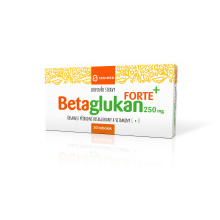 Betaglukan FORTE 250 mg, s 80 mg vit. C a 5 µg vit.D, 30 tob.
Betaglukan FORTE 250 mg, s 80 mg vit. C a 5 µg vit.D, 30 tob.
Distributor: SENIMED
Vyrobeno pro: Gynpharma -
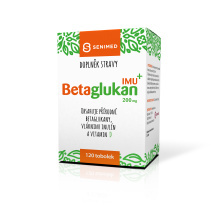 Betaglukan IMU 200 mg, se 150 mg inulinu a 5 µg vit.D, 120 tob.
Betaglukan IMU 200 mg, se 150 mg inulinu a 5 µg vit.D, 120 tob.
Distributor: SENIMED
Vyrobeno pro: Gynpharma -
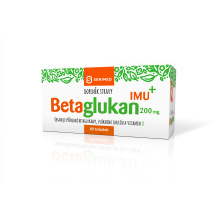 Betaglukan IMU 200 mg, se 150 mg inulinu a 5 µg vit.D , 60 tob.
Betaglukan IMU 200 mg, se 150 mg inulinu a 5 µg vit.D , 60 tob.
Distributor: SENIMED
Vyrobeno pro: Gynpharma -
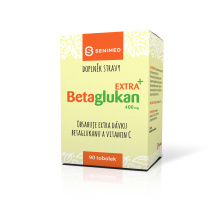 Betaglukan EXTRA 400 mg, se 40 mg vit.C , 90 tob.
Betaglukan EXTRA 400 mg, se 40 mg vit.C , 90 tob.
Distributor: SENIMED
Vyrobeno pro: Gynpharma -
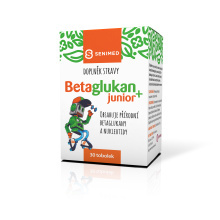 Betaglukan JUNIOR 100 mg s vit. C, zinkem a nukleotidy, 30 tob. Určeno pro děti a mladistvé.
Betaglukan JUNIOR 100 mg s vit. C, zinkem a nukleotidy, 30 tob. Určeno pro děti a mladistvé.
Distributor: SENIMED
Vyrobeno pro: Gynpharma -
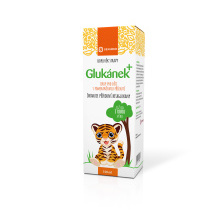 Glukánek sirup pro děti 150 ml, určeno od 1 roku věku, bez konzervačních látek
Glukánek sirup pro děti 150 ml, určeno od 1 roku věku, bez konzervačních látek
Distributor: SENIMED
Vyrobeno pro: Gynpharma